Gmail is a popular email service, boasting millions of users worldwide. For every online subscription you make, whether to a newsletter or an e-commerce site, you require a Gmail account. That means your inbox contains much information about you — from the products you purchased to who you conversed with and even your mortgage, which you probably don’t want to share with anyone.

But what if we tell you that Gmail is not as private as you think? Sadly, Google, Gmail, and their other partners have access to your information. That is why you should consider other alternatives that can guarantee you the utmost privacy you need.
Continue reading to discover the 13 best alternatives to Gmail that you can use in 2026.
The Best Gmail Alternatives – Quick List
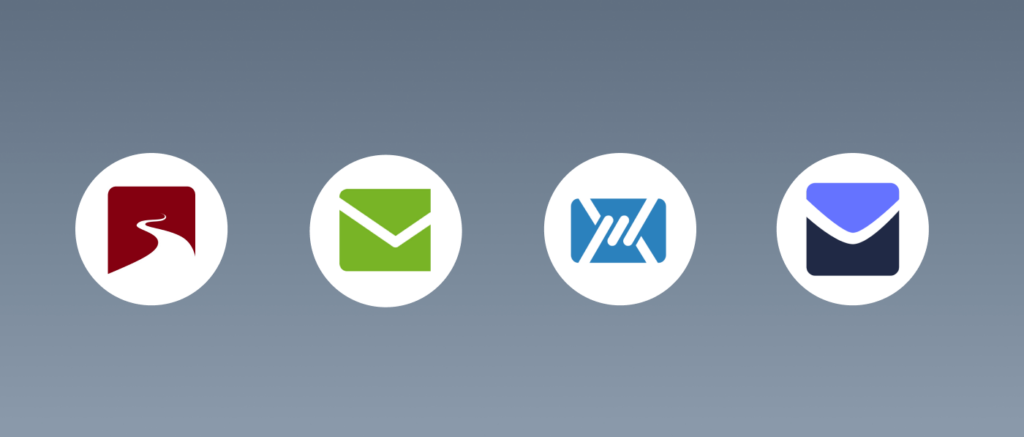
- Tuta: This service offers users an end-to-end encrypted and ads-free emailing experience.
- Mailbox.org: It provides its users with secure email addresses.
- Mailfence: This platform boasts a private and secure experience with state-of-the-art features.
- StartMail: You can create temporary email addresses when signing up for any service with this platform.
- ProtonMail: A fantastic option that ensures that your privacy is its priority.
- CounterMail: This is a secure and easy-to-use service designed to ensure your privacy and security from anywhere.
- Runbox: A secure email service that provides you and your business with encrypted communication.
- Posteo: An independent email provider that offers anonymous email accounts, calendars, and address books.
- Outlook: This email service Offers a simple interface that lets you keep track of new emails and meetings easily.
- Zoho Mail: This reliable and secure business email solution is designed to aid your business communication.
- iCloud Mail: It provides Apple users with a private and secure personal email.
- Spike: It lets you keep up with conversations and reply to emails quickly.
- Mailbird: An amazing email service that lets you integrate easily with other third-party platforms.
Why Do You Need an Alternative to Gmail?

The first thing you should know is that Gmail is one of the services provided by Google, and it’s no surprise that Google is notorious for harvesting its users’ data.
There was even a report in 2017 about it getting caught scanning its users’ email for any personal data they could use to inject targeted ads.
In fact, the tech titan was even charged with unauthorised wiretapping and snooping through their users’ emails during a lawsuit. Despite all this, Google still has bots that scan email inboxes for viruses and spam, auto-reply emails, and allow email searches.
Anytime you log into any online platform using your Gmail account, you may notice the app asking for permission to gain complete access to your mail.
Many people unquestioningly accept this request without question. They don’t know that these apps intrude on their users’ privacy once accepted by crawling through their email, and sometimes, actual people may be doing the reading, not bots.
What to Look for in a Gmail Alternative
If you care about your online privacy and don’t feel comfortable knowing someone is prying through your email, you need a new email platform. Not just any platform, but one that is privacy-oriented.
Here are some factors to look out for when selecting your next email platform:
- Open source: When an email platform is open source, the service’s code is made public, and anyone can check for vulnerabilities. This means you can trust and depend on the service, as any issue found will be announced publicly and fixed.
- Custom domain: This is an ideal feature to look out for if you work with a small team or business. It allows you to create a custom domain email address for your team members or employees.
- Encryption standard: You should consider email platforms that use PGP, the industry-standard encryption that helps encrypt all your data. Although it has limitations, most email providers provide Open PGP encryption, the open-source version of the PGP standard. This ensures that you can transmit end-to-end encrypted messages.
- Anonymous registration: This is a nice feature that lets you leave your identity a secret. That means you can use the platform anonymously, and all of your details remain private.
- Anonymous payment: Some platforms accept cryptocurrency or cash payments from anyone who wishes to subscribe to their service. Others separate the digital payment method from their users’ email accounts. This guarantees that your account information is safe from any online risk.
- IMAP, POP, and SMTP protocols: These protocols let you access encrypted mail using a mobile app or a third-party application.
- Jurisdiction and privacy policies: Where an email platform is based determines the level of privacy you should expect. Some of the platforms listed here are based in Europe, meaning they must comply with GDPR (General Data Protection Regulation) policies. They also have strict privacy policies. However, they won’t refuse a court order that asks them to share your date. They secure the data effectively, so there won’t be much information to give to a third party.
The Best Alternatives to Gmail – Detailed List
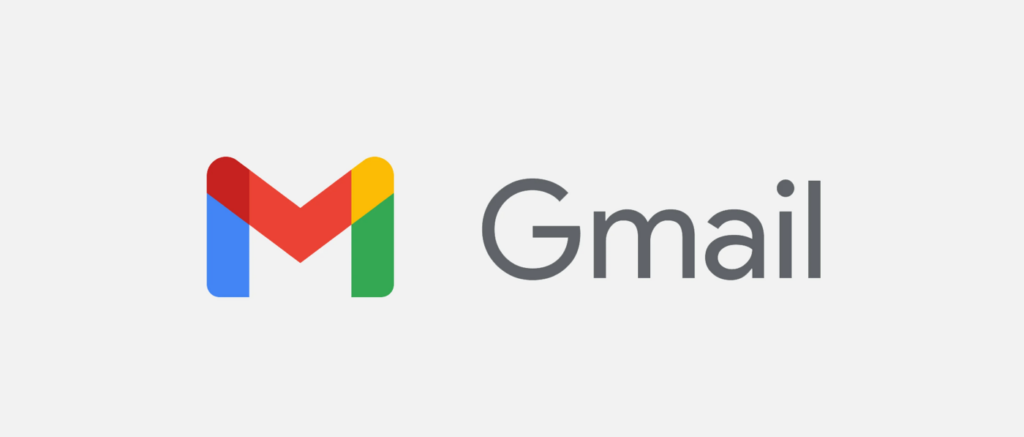
1. Tuta
Features:
- Supports custom domains
- Advanced text searching
- It is open-source
- Allows anonymous registration
- 1GB free storage (Paid plan offers 20GB storage)
- The free plan is only for personal use
Tuta, formerly known as Tutanota, is a German service with features that make it the perfect option for private messages. The platform ensures that your mailbox and contacts are encrypted completely. This encrypted information is then kept in its data centres in Germany.
However, Tuta won’t let you import or encrypt old emails; still, it has its default end-to-end encryption feature for sending emails to another Tuta user. Even if you email non-Tuta users, you can rest assured that the platform safeguards your data.
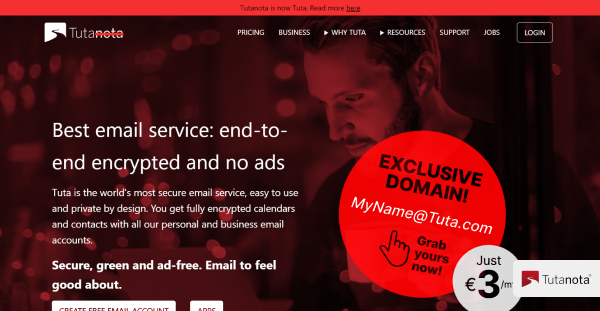
Tuta does not support POP, SMTP, or IMAP, which implies that the platform won’t work with third-party software or other email providers. Instead, It has its unique encryption package, which guarantees forward secrecy.
This email service adheres strictly to GDPR policies and ensures its users’ privacy is put first. It doesn’t track your activities or inject targeted ads.
Another thing the platform does is remove your IP address from your emails so that no prying eyes will be able to tell your location. Plus, it offers multi-factor authentication to ensure your emails are well-secure.
2. Mailbox.org
Features:
- It uses the PGP encryption standard
- Supports IMAP, SMTP, and/or POP protocols
- Allows users to create custom domains
- Permits anonymous payment and registration
This German email provider was launched in 2014 after the Snowden revelations. You can trust this service to enjoy an ads-free mailing experience alongside additional features such as a calendar, task planner, cloud storage, and contact lists.
Individuals, businesses, or teams can use this service for their communications, plus it also supports third-party platforms.

Mailbox uses SSL/TLS encryption when users transmit data and PGP encryption when data is at rest. All your emails will be stored on two data servers located in Germany; that way, your data will remain safe even if something happens to one of them.
This service values its users’ privacy, so it supports anonymous forms of payment like cryptocurrency and sending cash through mail. Because it believes that your data only belongs to you, it doesn’t read through your emails, not even for any statistical reason.
The only privacy flaw is that they log IP addresses. However, they use this information for security purposes and to gain access to the control feature. However, this information is deleted after four days.
3. Mailfence
Features:
- It uses PGP and OpenPGP encryption
- IMAPS, SMTPS, and POPS support
- Allows custom domain
- Digital signature to reduce email faking
- 20GB storage space
- Easy contact import
- Supports anonymous payment
- Free version is limited
This Belgium-based service is a perfect all-rounder that cares about your privacy. It offers features such as contact functionality and a calendar.
Mailfence boasts a unique feature enabling users to send encrypted mail to another user, even if their platform does not support OpenPGP.
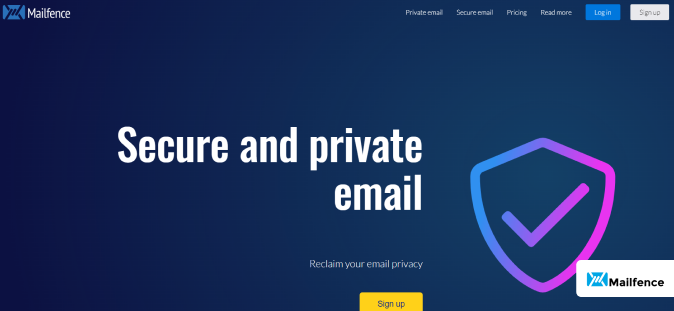
It uses symmetric encryption to create a key from the password you created for your message. You can even decide to set an expiry date before you send the message.
The recipient will get a URL that leads to your message but requires a password to open it. You can decide how you want the receiver to get the password.
Despite its unique features, Mailfence logs its users’ IP addresses, sender and receiver addresses, message IDS, subjects, countries, timestamps, and browser versions.
4. StartMail
Features:
- Email end-to-end encryption
- It lets users create custom domain names
- It is open source platform
- Instant email deletion
- No ads or tracking
- Supports anonymous payment
- 20GB of storage
StartMail was designed by a Dutch private search engine so that you can trust this email service for total privacy. The only data they gather is the ones that are relevant to the service they provide, which include your IP address, country, clicked links, and device model.
This information collected will only be stored for the duration of your browsing session, after which it disappears. It only keeps your IP address for security reasons and deletes it after three days.
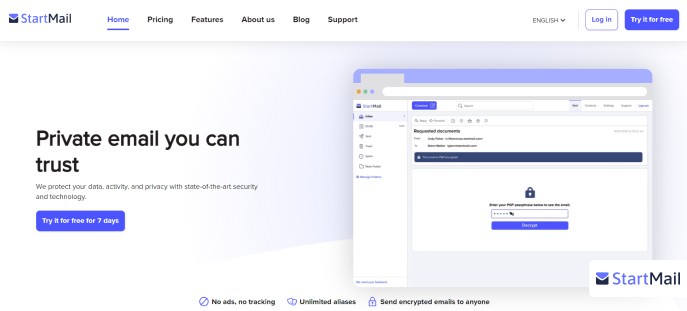
This email service offers PGP encryption and stores your data on secure Dutch servers. One feature that stands out is that they encrypt your information from the server instead of your browser. This can ensure that your data is well-guarded.
You can subscribe to the service using your credit/debit card or a cryptocurrency wallet. If you choose the card option, the platform assigns your payment data to a unique number different from your account details. This helps ensure that you have a safe transaction and that your financial information is secure.
5. ProtonMail
Features:
- Email encryption
- Supports IMAP, POP, and SMTP protocol
- Allows anonymous registration
- 20GB of storage space
- Encrypted calendar and storage space
- It allows users to create custom domains
- It uses an open-source code
ProtonMail is a Swiss email provider that offers PGP encryption for all emails. It uses a zero-knowledge policy to encrypt your data, and the ProtonMail team cannot read your emails.
This platform offers a self-destructing message tool that ensures your email messages are deleted after a designated period. One downside is that it won’t encrypt your email’s headers, metadata, or subject lines.
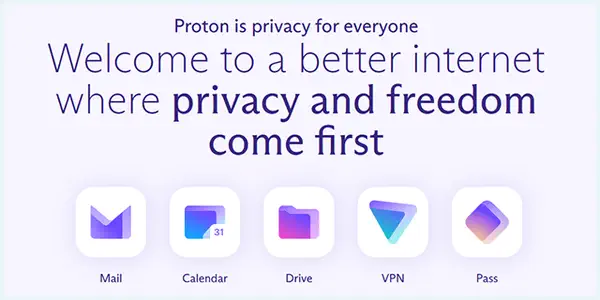
However, this service is a safer option than Gmail, considering that it protects its users’ data so that even an intruder won’t be able to decrypt anything.
It also won’t track your personal data, scan your emails, log your IP address, or ask for any personal information when signing up. ProtonMail has a free service, but you can upgrade to a premium package for more features and storage.
6. CounterMail
Features:
- Email encryption
- Supports IMAP, POP, and SMTP protocol
- Enables custom domain
- It is open source
- Allows anonymous registration and payment
- 4GB worth of storage space
Although the CounterMail interface may look outdated and unfriendly, it has been in the email industry for ten years and offers some of the strongest encryption available to its users.
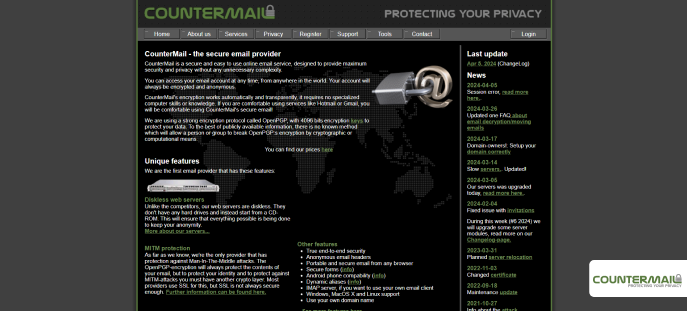
It uses OpenPGP encryption but only provides a 4096-bit encryption key with a strict no-log policy. The email provider stores all your data on its Swedish servers, which have strict privacy laws.
CounterMail also has an in-built password manager and offers extra security layers through its servers, which are protected with full disk encryption. This ensures that any connection you make with the servers goes through a secure tunnel to prevent middle-man attacks and IP leaks.
7. Runbox
Features:
- Allows custom domain
- 100 email aliases per account
- Supports anonymous payment
- 25GB storage space
- Email profiles and folders
- Provides spam and virus filter settings
- Easy access to emails than third-party email platforms like Gmail
- Custom filters
This user-friendly email service has features that guarantee your mail safety and privacy. The platform is Norway-based, and it follows a strict constitution regarding online privacy.
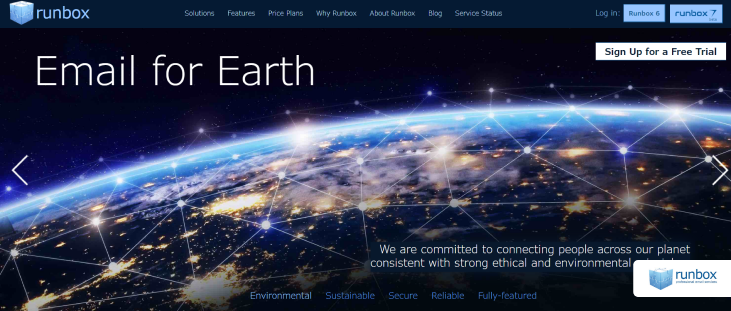
You can easily import your emails from Gmail without breaking a sweat. However, if you need help, you can always check out their “How-to” guides. Runbox runs an open-source platform, so it allows users to inspect its code for any vulnerabilities.
Although the platform provides end-to-end PGP encryption, you will need to set it yourself, as it doesn’t offer any default settings for this purpose. This may require technical knowledge, but you can do it by doing some research.
8. Posteo
Features:
- Email encryption
- Allows anonymous signup and payment
- 20GB storage space
- Offers OpenPGP and TLS encryption
- No tracking or logging
- It is open source
Posteo complies with strict European privacy policies. It is self-financed, which means you have nothing to worry about regarding your data privacy. However, you will have to pay a fee to access their service.
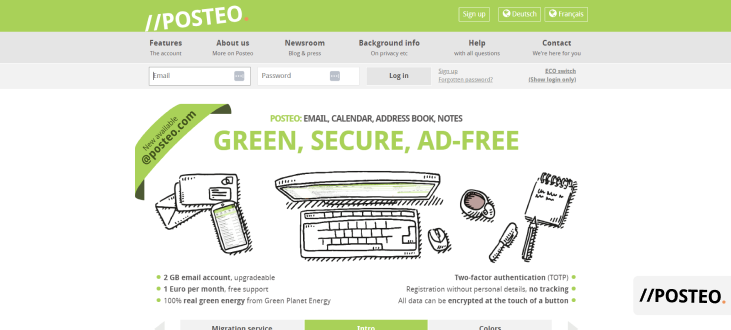
This email service supports IMAP protocol, meaning you can use this platform on any device you choose. The only downside to using this service is that it does not allow users to create custom domains.
9. Outlook
Features:
- Email encryption
- Contact syncing option
- Malware and spam filter
- Free access to Microsoft Office 365 online version (Word, PowerPoint, and Excel)
- Integrated email and calendar
- 15GB storage space
- 5GB of OneDrive storage
Microsoft Outlook has a sleek design that works seamlessly with other Microsoft-owned services. The platform acts simultaneously as an email service and a calendar. It also allows you to communicate with your colleagues and plan future meetings.
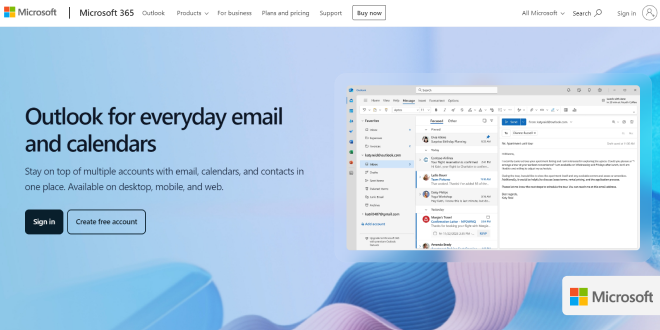
Sadly, on November 30, 2023, the email service stopped allowing users to create custom email domains. Existing users can continue using it, but new users won’t be able to access this feature any longer.
10. Zoho Mail
Features:
- End-to-end and S/MIME encryption
- Offline mode
- Spam filter and blocklist
- Email follow-up and notification
- Integrate with other Zoho products like Zoho Docs, Workdrive, and Notebook
Zoho Mail is another great email substitute. It is a feature-rich email service that is suitable for small businesses. It contains different organisational tools, such as a calendar, tasks, storage drive, bookmarks, and contacts. The platform has a neat interface that allows you to organise your emails easily.
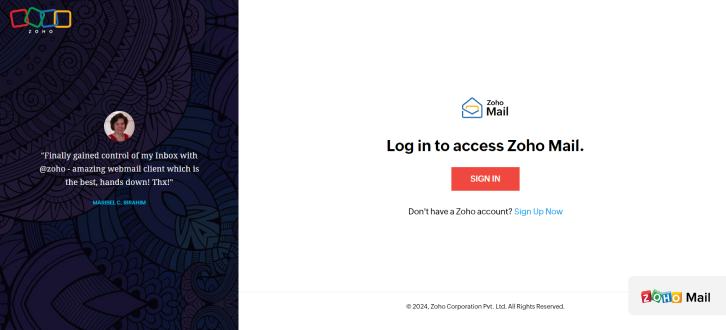
It comes with a Streams feature, which enables you to comment on an email thread, exchange files, or assign tasks. You don’t have to worry about your privacy, as the platform has end-to-end encryption and secure email hosting on all messages.
You can easily set up a custom email for your businesses using Zoho Mail, which is an excellent choice if you want to have a more professional presence.
However, all custom domains are only accessible through Zoho Mail mobile apps or webmail, except if you upgrade to its premium plan.
11. iCloud Mail
Features:
- It supports S/MIME for encrypting messages
- Allows users to add and manage email aliases
- 5GB free storage space
- Integrates seamlessly with the mail app on your Apple device
- No ads and tracking
- Spam and phishing protection
- Allows custom domains
iCloud Mail is the perfect choice for MacOS users who like slick, pixel-perfect solutions. In addition to your Apple device, you can view your iCloud mail on your Windows computer using Microsoft Outlook or by signing in with your Apple ID.
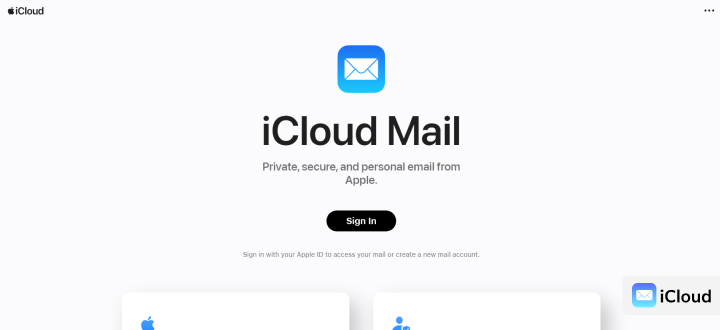
This email service offers mail privacy protection for all its users so that no third party, including a message sender, will be able to get any information from your activities. It even hides your IP address and keeps your mail secure using encryption and two-factor authentication.
Its “Hide My Email feature” allows you to create a unique and random email address that forwards messages directly to your inbox. Thus, you can send and receive emails without revealing your actual address.
12. Spike
Features:
- Email encryption
- Allows email groups and video meetings
- Contains collaborative notes
- Email hosting and custom domain
- Priority inbox
- Calendar and file management
Spike is a collaborative email platform that streamlines workflows and transforms emails into real-time chats. Although it requires some upgrades, you can even decide to keep your Gmail account while using this platform.
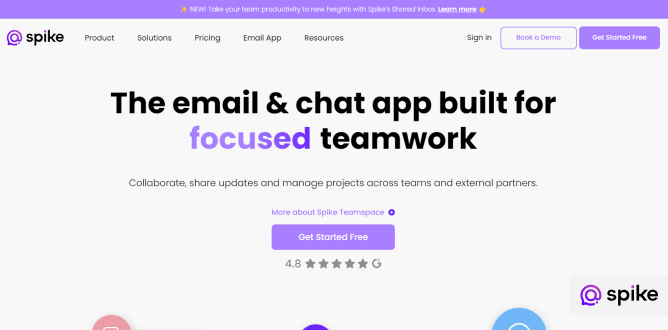
The service comes with a Magic AI feature that assists you in creating compelling emails. It can even send replies for you.
Using this platform, you can create channels among different users worldwide. Its Intelligent Priority inbox feature lets you remove distractions and help you focus on important messages.
Spike’s calendar allows you to merge all the calendars available on your device together and avoid overbooking or missing appointments. It also has an Advanced email search that lets you preview attachments and filter through results by keyword, person, or file type.
13. Mailbird
Features:
- Email encryption
- Seamless third-party app integration
- Customisable workspaces
- AI email writing
- Centralised email management
- Attachment search
Mailbird is an excellent platform that offers a native app for Windows users. The email service boasts a sleek design that you can customise to your liking.
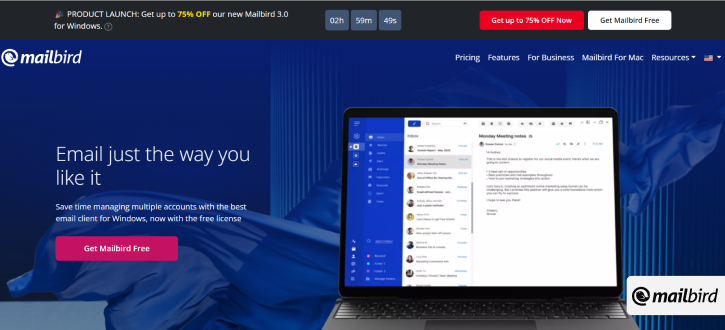
It has features that let you snooze your emails and undo messages sent. Regardless of size, you can use this tool for your business team.
How Can I Choose a Gmail Alternative that Meets My Needs?
If you are searching for a Gmail alternative that ticks all your boxes, here are some factors you should consider:
- Price: Subscribing to an email service is not a one-time purchase. So, you should ensure your email provider is within your budget and won’t affect you financially.
- User interface: As this tool is a vital communication tool, it’s necessary that you should choose a new email app that is not hard to navigate. Inspect the new service’s layout and design before subscribing to it to see if you will enjoy using the platform.
- Storage space: Many independent email services offer 1GB of storage by default, which is less than Google’s 15 GB. If you know you require a high-volume space, check if the email platform allows you to purchase more storage space.
- Data transfer: To avoid the stress of transferring all your messages on your Gmail account to the new email platform, your ideal platform should be well-equipped to support you with that process. This can even help you prevent any data loss.
- Scalability: As a business owner, consider a platform that allows you to add more users as your business grows. You should check how many custom domains or email addresses the platform will enable you to create. The email service should not limit you, especially if you use it commercially.
Some Gmail substitutes can let you use its platform for free, but if you subscribe, you can use it worry-free and in complete privacy.
